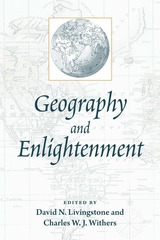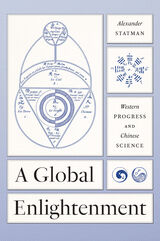4 start with G start with G

The first set of chapters charts the intellectual and geographical contexts in which Enlightenment ideas began to form, including both the sites in which knowledge was created and discussed and the different means used to investigate the globe. Detailed explorations of maps created during this period show how these new ways of representing the world and its peoples influenced conceptions of the nature and progress of human societies, while studies of the travels of people and ideas reveal the influence of far-flung places on Enlightenment science and scientific credibility. The final set of chapters emphasizes the role of particular local contexts in Enlightenment thought.
Contributors are Michael T. Bravo, Paul Carter, Denis Cosgrove, Stephen Daniels, Matthew Edney, Anne Marie Claire Godlewska, Peter Gould, Michael Heffernan, David N. Livingstone, Dorinda Outram, Chris Philo, Roy Porter, Nicolaas Rupke, Susanne Seymour, Charles Watkins, and Charles W. J. Withers.


The Enlightenment gave rise not only to new ideas of progress but consequential debates about them. Did distant times and places have anything to teach the here and now? Voltaire could believe that they did; Hegel was convinced that they did not. Early philosophes praised Chinese philosophy as an enduring model of reason. Later philosophes rejected it as stuck in the past. Seeking to vindicate ancient knowledge, a group of French statesmen and savants began a conversation with the last great scholar of the Jesuit mission to China. Together, they drew from Chinese learning to challenge the emerging concept of Western advancement.
A Global Enlightenment traces this overlooked exchange between China and the West to make compelling claims about the history of progress, notions of European exceptionalism, and European engagement with Chinese science. To tell this story, Alexander Statman focuses on a group of thinkers he terms “orphans of the Enlightenment,” intellectuals who embraced many of their contemporaries’ ideals but valued ancient wisdom. They studied astronomical records, gas balloons, electrical machines, yin-yang cosmology, animal magnetism, and Daoist medicine. And their inquiries helped establish a new approach to the global history of science.
Rich with new archival research and fascinating anecdotes, A Global Enlightenment deconstructs two common assumptions about the early to late modern period. Though historians have held that the idea of a mysterious and inscrutable East was inherent in Enlightenment progress theory, Statman argues that it was the orphans of the Enlightenment who put it there: by identifying China as a source of ancient wisdom, they turned it into a foil for scientific development. But while historical consensus supposes that non-Western ideas were banished from European thought over the course of the Enlightenment, Statman finds that Europeans became more interested in Chinese science—as a precursor, then as an antithesis, and finally as an alternative to modernity.

In 1777 Edmund Burke remarked that for his contemporaries “the Great Map of Mankind is unrolled at once.” The period from the late seventeenth century to the end of the eighteenth century had seen a massive increase in Britain’s knowledge of the non-European peoples of the wider world, and this was reflected in the proliferation of travel accounts of every kind.
This is a history of British perceptions of the exotic peoples and lands of Asia, North America, West Africa, and the Pacific who became well-known during that great age of exploration. It shows how the contours of intellectual and cultural history changed as news poured in. Philosophers contemplated man in a state of nature; the study of religion was broadened as Hinduism, the naturalistic religions of North America, and Chinese rites and ceremonies were revealed. Racial issues like slavery and negritude, questions about advanced versus backward nations, the great Chain of Being argument, and the Unchanging East theory became concerns of educated persons. Along with the impact of explorations on men’s ideas, the use of “sciences” like anthropology, ethnology, archeology, and philology came into vogue. And not incidentally, interest in empire grew, missionary zeal was strengthened, and tolerance and intolerance toward strangers struggled for dominance.
It could be argued that by the end of this age of “enlightenment,” investigation of the inhabitants of these distant lands had reinforced those assumptions of superiority that were an essential feature of British global expansion. To that extent this book is concerned with the intellectual foundations of the second British empire, for it seeks to show how many of the attitudes present in Britain’s dealings with the world in her imperial heyday were formulated during the eighteenth century.
READERS
Browse our collection.
PUBLISHERS
See BiblioVault's publisher services.
STUDENT SERVICES
Files for college accessibility offices.
UChicago Accessibility Resources
home | accessibility | search | about | contact us
BiblioVault ® 2001 - 2024
The University of Chicago Press









